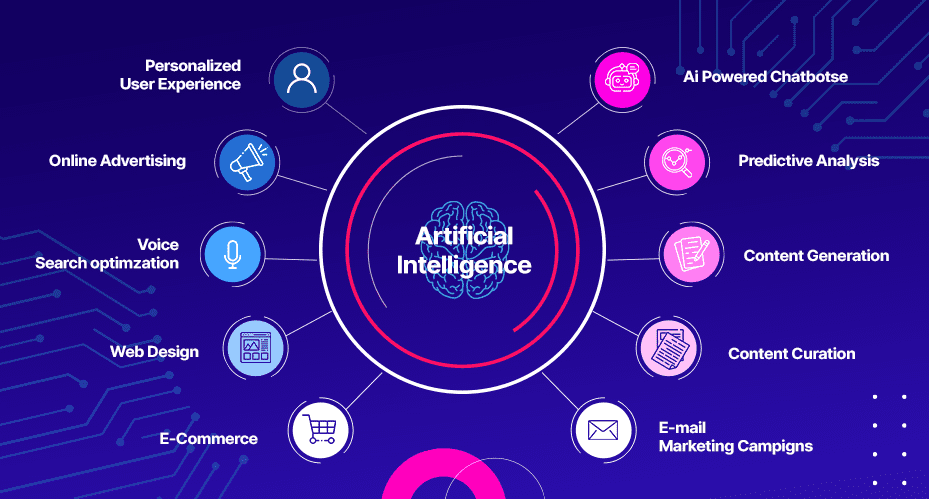According to a recent study by Accenture, just 12% of companies currently use AI to boost their growth and results. Of these 30% of their revenue would be attributable to artificial intelligence. At the same time, these companies stand out in terms of customer experience and sustainability while growing up to 50% faster than their peers. And this is across the board, some AI programs deliver unbelievably higher returns.
In this article, we take a look at what artificial intelligence is, what it can be used for, and how it can impact your marketing strategy.
What is Artificial Intelligence (AI)?
How to define Artificial Intelligence?
Artificial Intelligence (AI) is a branch of computer science that deals with the design of computer systems capable of intelligent behaviour – thinking for themselves. This is distinct from them being sentient, where the computer would also need to have feelings or emotions, which is a whole other can of worms.
AI relies on machine learning, such as identifying individual human actions and adjusting to accommodate that data in its actions, amending the reaction because of the newly learnt input. Aspects such as voice and image recognition, natural language understanding, and other technologies to simulate human intelligence are also ML examples. Its goal – to perform tasks that normally require human intervention. In other words, to think and act like us.
How does artificial intelligence work?
Artificial intelligence is the result of a multidisciplinary approach:
- electronics: data collection, neural networks,
- computer science: data processing, deep learning,
- mathematics: data analysis models.
AI relies on a technology based on sets of algorithms, allowing devices and software to be equipped with analysis and decision-making capabilities. Thanks to the data already assimilated (machine learning and deep learning), it can adapt to different requests and situations by making predictions. ML in email marketing is the most obvious application, to identify not only products and preferences, but patterns in purchase habits i.e. not just brand loyalty, but habitual habits and how that individual’s decision was reflected in their on-screen keystrokes, each unique to the individual.
Artificial intelligence is based on 3 pillars: intentionality, intelligence, and adaptability.
AI has grown phenomenally in the last few years and is now, more than ever, the flagship sector of IT. It has profoundly impacted how work is organised and human-machine interactions and is now the reason why multiple software and applications are being developed.
GPT-3 is the most significant language model in artificial intelligence and is widely praised. Developed by the American company OpenAI, GPT-3 had no less than 175 billion parameters at its launch in 2020!
The Impact of Artificial Intelligence on Ecommerce Marketing
Companies have become aware of the valuable assistance provided by AI and are increasingly using it in their operations and activities.
In marketing, artificial intelligence can speed up and improve marketing processes, while reducing operating and training costs. But many interpret this as merely a data analytics tool, rather than their shopping around for applications where the AI has been developed to undertake a complete whole process for you, such as SwiftERM, which requires zero human input whatsoever.
With this type of AI, the application not only uses purchase history, to define products most likely to be purchased next but additionally runs autonomously to populate an email stylesheet and present those items most pertinent to each consumer, at a time the machine learning algorithm has calculated as their most likely maximum response optimisation opportunity.
Means nothing? Then consider reports by McKinsey, Forrester, Bain and Statista which suggested the ROI from such adoption could be as high as 20 times the returns then every other aspect of marketing combined, including CRO, SEO, Google Ads, Multi-channel and social-media. That’s hard cash being disdainfully ignored, while competitors using its prospect. you don’t need a data scientist to analyse it, or indeed any of the myriad of new tools for doing so. Instead, it can be put immediately to use, complementing your existing IT stack.
Personalisation right down to its core principle – treating each person individually, is entirely the domain of AI machine learning. The autonomy allows a massive hike in average order value, which naturally reflects likewise in lifetime customer value. But critically, as appreciation of personal selections sinks in, so too does loyalty to you and the brands you sell. You can also sit and watch the rate of return figures crash through the floor.

Further use of Artificial Intelligence in marketing
Content personalisation: AI can help companies tailor their marketing strategy to the interests and behaviour of their target audience.
Using data on users’ browsing habits and preferences, AI tools can personalise offers and landing pages to maximize conversion rates, while improving the user experience.
Time optimisation: AI can automate tasks such as keyword research, headline generation, and content production, which can free up time for more strategic thinking or creative activities.
Data Analytics Performance: AI can help companies understand trends and make more informed decisions by quickly and thoroughly analyzing large amounts of data.
Customer relationship: chatbots can manage real-time interactions with customers and help them resolve their issues quickly.
The benefits and limits of artificial intelligence
Benefits and advantages of AI
The advantages of artificial intelligence are undeniable and multiple:
- Time-saving: AI can work 24/7, 365 days a year. It is tireless.
- Money saving: repetitive tasks with little added value can be delegated to it to increase its productivity
- A source of information: continuous, universal, heterogeneous, allowing to approach different axes
- Data exploitation: extraordinary processing capacities
- Versatile use: vast areas of expertise, from the simplest to the most complex
- Massive increase in your rate of return, the fundamental reason everyone is getting on board.
Conclusion
Making a conscious decision to postpone consideration of AI in ecommerce marketing could be of cataclysmic detriment to your business. We all appreciate that with huge volumes of opportunities and offers cascading their way into your considerations, it is difficult to distinguish the wheat from the chaff. Nevertheless, fear of the unknown should not impact your effort to secure the best for your company. Be inspired to find the solution that is right for you as quickly as possible, the dividends will make it worth your while.





